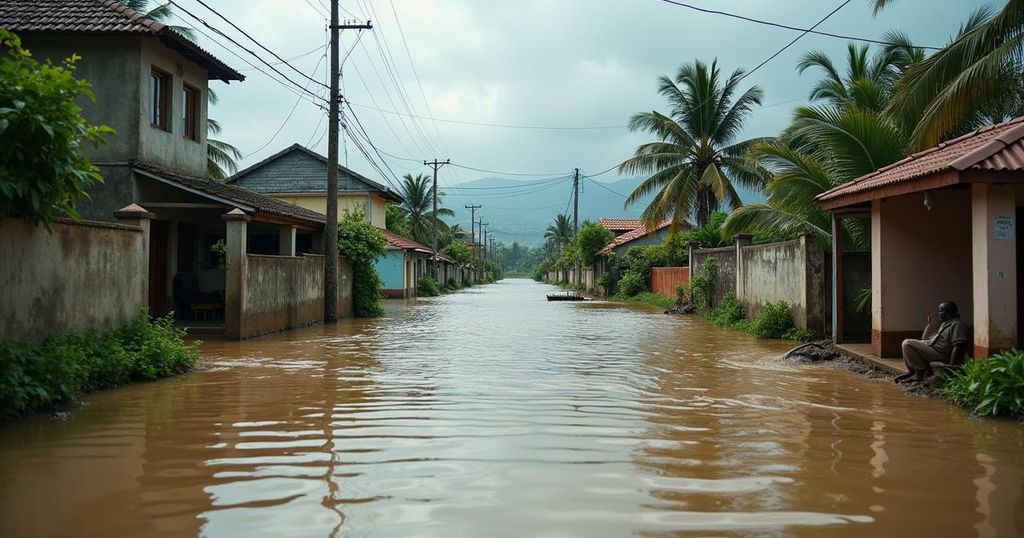Devastating Impact of Flooding in Western Africa: A Climate Crisis Unfolding
West and Central Africa are currently facing a significant humanitarian crisis due to catastrophic flooding that has led to over 1,000 fatalities and impacted more than 4 million individuals. Countries like Nigeria are particularly affected, with local systems overwhelmed by extreme weather, infrastructural failures, and a lack of preparedness. Experts stress the role of climate change in these disasters, advocating for improved adaptation strategies and international support for developing nations to mitigate future risks.
In recent weeks, West and Central Africa have experienced catastrophic flooding that has resulted in significant loss of life and widespread displacement. According to reports, over 1,000 individuals have perished due to the floods, with more than 4 million people affected in countries such as Nigeria, Mali, Senegal, and Chad. In Borno State, Nigeria, the capital city of Maiduguri has been particularly devastated, with the governor estimating that nearly 2 million residents are experiencing the dire consequences of this disaster, which has left many without essential food and shelter. The floods have drawn parallels to other climate-related emergencies, such as the earlier attacks by Boko Haram, yet those affected express that the current situation poses a more severe threat. Journalists have recounted harrowing rescue operations amidst the floods, emphasizing the chaos and struggle for survival faced by residents. Accounts detail the desperate conditions under which individuals, including pregnant women and children, have been rescued after lengthy periods of entrapment without access to basic necessities. Experts in climatology attribute the severity of the situation to both climate change and infrastructural failures, notably the collapse of the Alau dam. Although predictions indicated increasing rainfall, local authorities were ill-prepared for such an intense downpour, which was far beyond their capacity to manage. The decay of existing infrastructure due to neglect, alongside a lack of funds and political corruption, has compounded vulnerabilities. In discussing climate change perceptions in the region, some locals equate climate phenomena with divine intervention rather than understanding them as consequences of human activity. Dr. Vincent Nduka Ojeh, a climatologist, noted the crucial need for acknowledgment of climate change rather than viewing such events as acts of God. He explained that the inadequate resilience of Nigeria’s infrastructure severely hinders the country’s adaptation capabilities. Additionally, funding for climate adaptation has been notably insufficient. While developed nations have pledged considerable funds for recovery in other areas affected by flooding, developing countries like Nigeria struggle to secure the necessary resources to combat the impacts of climate change effectively. Dr. Ojeh stresses the importance of finding balance in responsibility; countries in the Global North need to support the Global South while also ensuring that adequate plans for adaptation are in place. Moving forward, experts suggest immediate governmental actions to protect affected populations, restore basic living conditions, and enhance infrastructure to better withstand future climate disruptions.
The topic surrounding the floods in Western Africa highlights the intersection between climate change and humanitarian crises. Recent flooding incidents underscore the vulnerability of nations such as Nigeria and its neighbors, which lack adequate resources and infrastructure to withstand extreme weather patterns exacerbated by global climate change. The conversation surrounding these events often reflects broader issues of governance, resource allocation, and societal perceptions of environmental changes and their causes. In regions where climate impacts are not only frequent but also increasingly severe, understanding the dynamics contributing to these disasters is crucial for effective intervention and support.
In conclusion, the catastrophic flooding in Western Africa serves as a stark reminder of the profound impact of climate change and the urgent need for enhanced adaptation strategies. The situation warrants immediate action from local governments and international communities alike to address the pressing humanitarian needs and to invest in resilient infrastructure. Furthermore, it highlights the necessity for global collaboration to ensure that developing nations are adequately supported in their fight against climate-related disasters. Without concerted efforts, lives will continue to be endangered in the face of increasingly severe environmental events.
Original Source: insideclimatenews.org




Post Comment